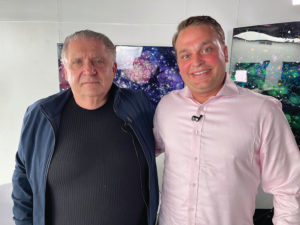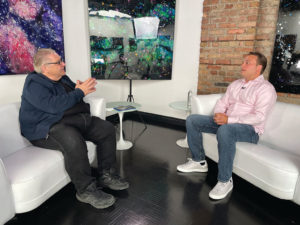“The pandemic has exposed a lot of the shortfalls in our communities”
Our Children’s future in Education

The beginning of the school year and the return to classes is approaching in one of the most challenging years to do so. With the slow return to a new normalcy – dictated by face masks and social distancing – the pandemic has still not given us a truce, and parents, teachers, students, and staff may feel anxious. But one thing is certain – education is probably one of the sectors that will most impact our children’s future.
Vince Nigro invited Christopher Mammoliti to Here’s The Thing (Camões Tv) to enlighten us on the Toronto District School Board (TDSB) role and performance. Mammoliti is the current Vice-Chair, representing Humber River – Black Creek in his role as Trustee. His interest in politics emerged when he saw in it an opportunity to develop the community. Making one of his goals to sit at every committee to get the widest range of information possible allows him to create a better future for all students.
Vince Nigro: Can you tell us more about the School Board? How do things work, and how do elections happen?
Christopher Mammoliti: At the TDSB level, we have 22 trustees, all elected at the time of municipal elections, along with the Mayor and City Councils. You would elect both the public and Catholic trustees. Ultimately the Trustee’s role is to hire the Director of Education – that is the major decision we have to make. Finally, the Director of Education is the one that creates the culture, operation and decision-making that comes throughout the Board.
VN: You come from a political family; your father was involved in politics. Was politics something you always considered?
CM: First of all, I was very lucky. It was very beneficial to grow up in the environment that I did. My father allowed me to see things. He brought me to environments that are critical to the way society really operates. For me, it was not always something that I was driven to. I went to school for business management. My headspace was always in trying to build something; I’m a team builder. It wasn’t about six to seven years ago, and I got sick with it. I battled with thyroid cancer, which gave me a lot of perspectives. I felt that I had an opportunity in my path that I wasn’t taking advantage of – I mean it from the perspective that I had an opportunity to make a positive change. I wouldn’t say that I’m a “typical” politician; I’m compassionate, I want to do good for people. My father encouraged me to run and be myself.
VN: The battle you had at such a young age for sure gave you perspective. At the time your father was running for Council, you run for the School Board. You are at an age where you are able to relate to a lot of the current scenarios, and I’m assuming that has been an advantage for you.

CM: Absolutely. Personally, I believe that youth must be involved in politics. The School Board is still politics – even though, in my perspective, it’s different from what you see in the mainstream political world. Being young, having the connectivity to technology – and during the pandemic, we saw how important that has become to society – and the ability to understand it and put it to use in your role is an incredible asset. My goal is to come to an environment, try to commit to the culture, build the culture positively, and build the team around you. I will work hard to deliver.
VN: What advice would you give to someone interested in getting involved in politics but is unsure if they can accomplish it?
CM: Never limit yourself. Trust yourself. Give yourself every opportunity to break down. If you are not putting that faith into yourself, people will feel that they won’t believe what you are talking about. On the other hand, nothing is unattainable if your goal, your vision and your strategy are focused.
VN: In the past, sometimes, even failing was a great lesson. You can at least say that you tried it.
CM: Absolutely. It’s the perspective you take. Failing is an opportunity to learn, to find a gap in your strategy. If you don’t find those gaps, you are not able to better yourself as a leader. So never run from an opportunity; take advantage, try, and do your best.
VN: Tell us about the role of a Vice-Chair on the School Board.
CM: The main role is to support the Chair ultimately. The Chair will let us know the kind of support he/she is expecting. Our current Chair is Alexander Brown.
VN: What kind of issues did you encounter once you got there?
CM: It was way more than I anticipated, to be honest. Not everyone understands what a Board does regarding the full operation and responsibility, what goes into the decisions, the meetings, the planning. It was amazing. A lot of information. A lot of personal growth.
The TDSB staff were a great team to work with. They helped me learn. I believe the key is to listen and work together. Trustees need to work alongside the bureaucrats and the staff. That’s how you make the positive change we need to see.
VN: What are some of the important issues that you would like to see worked on?
CM: From the School Board level, definitely equity of access it’s the most critical. Then, bringing programs back to our community. Build the community pride back. Of course, safety, considering we are in the middle of a global pandemic, we’ll soon be back to school. Making sure we have the proper resources. These are all important pieces in a heavily marginalized community.
VN: How big is the School Board budget?
CM: Right now, we are at 3.2 billion. It’s not always easy to allocate that money. At the TDSB, we have additional responsibilities. Our Board tends to lead the education perspective. We have 558 schools across the city of Toronto. Multiple boards amalgamated to create the Toronto District School Board, which creates both challenges and opportunities. It also means that how we try to lead will influence other Boards and other decisions in other areas.
VN: When the pandemic hit, how was your perspective?
CM: At first, I was just like everyone else – kind of just watching. I will never forget the day that it was decided that the school boards would shut down. Everyone was just in shock. I don’t think that anyone anticipated that it would come to it. I felt it was an opportunity to utilize the pandemic to show what is missing in some areas of our society. The pandemic has exposed a lot of the shortfalls in our communities. At the beginning of the pandemic, we put out a motion to get all levels of government at the table so we could analyze those who were getting infected. Hoping that would open people’s eyes to the impact of marginalization and the inequity of access.
VN: Do you feel Covid is here to stay?
CM: The perspective that I’ve gained comes from the advice we got from Public Health. I believe it’s a virus, and as we have seen with many, including other Coronavirus, they do tend to stay. In my perspective vaccinations are important, because we need to look at this as something we have to prevent and prevent major illnesses. We have to prevent our ICUs from being at overcapacity. We have to prevent our students and public institutions from getting sick.
VN: Many people consider the Minister of Education message to be confused. What do you think about Lecce’s answer to the issue we face?
CM: It’s important to recognize we are in a pandemic, so there’s no road map. I think the failing exists because you must utilize your societal partners and the expertise they have built. Our current leadership could grow in working more with their partnership. The communication is not strong enough, and there isn’t a strong relationship with the TDSB. We need to work together to grow our communities. There has been a lot of indecision and not a lot of strategic planning, and that’s why you see a lot of changes in decisions. You could avoid that if you sat down with your parts and listen to their expertise on the subject, you are looking to make changes on. I don’t believe that we invested enough in public education. I think the pandemic has made that very clear. I believe the information we get is typically last minute which, to me, indicates a lack of planning. From a leadership perspective, that’s concerning. I understand the unknown, but noting stops planning from happening.
VN: School will start in the next few weeks. Do you feel that teachers and students are comfortable going back to classes?
CM: On this, I will only speak for myself – not for the Board. Personally, I don’t. I do not believe we have the resources in place. Considering the Delta variant’s impact on our youth, I don’t think class size should be normal right now. These are the planning pieces I’m speaking about – the short-term decisions you can make to prevent long-term damage. I don’t believe this virus will just disappear. So, we have to learn how to build a safe environment for our students to be educated and but also ensure the safety of our teachers, volunteers and community. We are not providing those resources right now. I don’t feel that the decisions have been made and the communication has been conducted to create the best possible environment.
VN: If you have to give parents an advice, what would it be?
CM: Give them the best sense of normalcy you can. Over the last two years, our students have suffered some of the biggest societal gaps that we have seen. We have grade 10’s that haven’t even walked through their school yet; grade 9’s that haven’t had orientation; students in grade 8 that didn’t have graduation. My advice to our communities is to make our students feel safe. Communicate to them. Make them feel that it is ok, we are back to normal at some level, so they can focus on their studies. I wouldn’t want our students to say that it’s not safe for them to go back because that is not my point. My point is that I’m always looking to 100% safety, even if that is unreasonable, and I don’t believe we made enough effort to get to 100. We were never going to be perfect; that needs to be clear. I don’t want parents thinking they shouldn’t send their children back to school, and I believe they have to. Learning from home is not conducive for many of our students to grow on an education level. We need to have our students back in our facilities. We need them in front of our teachers. Students learn better if they are able to engage and ask questions in smaller classroom settings.
We do need to raise the alarm on what decisions we are making to being preventive. How are we ensuring the numbers are mitigating? These are the decisions I would like to see adjusted. We need to put processes in place to ensure that education is delivered.
VN: If someone wants to reach you, how can they do it?
CM: They can do so via email at [email protected]. You can get me on any social media platform. Facebook, Instagram and Twitter. You can reach our office TDSB at 5050 Yonge Street.
Watch this interview at Camoes TV, Saturday (Aug. 28) at 9 pm.





Redes Sociais - Comentários